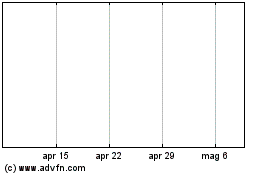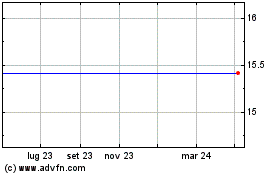France's Role Limits Renault Chairman -- WSJ
12 Giugno 2019 - 9:02AM
Dow Jones News
By Nick Kostov and Stacy Meichtry
This article is being republished as part of our daily
reproduction of WSJ.com articles that also appeared in the U.S.
print edition of The Wall Street Journal (June 12, 2019).
PARIS -- In declining to back Fiat Chrysler Automobiles NV's
plan to merge with Renault SA, the French government risks
weakening its chief negotiator in any future talks, Renault
Chairman Jean-Dominique Senard.
Renault shareholders are expected to vote in favor of Mr. Senard
on Wednesday, when they hold their first annual meeting since the
executive was appointed in January to succeed Carlos Ghosn.
Renault's biggest shareholder, the French government, has said Mr.
Senard has its full confidence.
The vote of support, however, masks underlying tensions between
Mr. Senard and the government, according to people close to
Renault. Mr. Senard considered resigning in the hours after Fiat
Chrysler withdrew its offer last week, said a person familiar with
Mr. Senard's thinking. He decided to stay after receiving messages
of support from Renault's board and the French government, the
person said.
Fiat Chrysler and Renault haven't ruled out the possibility that
merger talks could resume, and the French state considers Mr.
Senard as crucial to any future negotiations. Mr. Senard has spoken
with Fiat Chrysler Chairman John Elkann a number of times since the
deal fell apart, according to people familiar with the matter.
Mr. Senard ran into trouble shortly after his appointment as
chairman in late January. The French government tapped him to
stabilize Renault's decadeslong alliance with Nissan Motor Co. That
partnership had grown increasingly turbulent after Mr. Ghosn's
arrest on allegations of financial misconduct. Mr. Ghosn has denied
the charges.
To the French government, Mr. Senard appeared well-suited for
the role. The son of a diplomat, he had a long career in French
industry, most recently as CEO of tire maker Michelin.
"We have to strengthen the climate of confidence and cooperation
that in the past has been the strength of the alliance," Mr. Senard
told reporters at the time.
Behind the scenes, Mr. Senard got to work on plans to merge
Renault. His first plan called for Renault to merge with Nissan by
creating a holding company that was split evenly between the car
makers' shareholders. Nissan refused to consider the idea.
That left Mr. Senard to focus on talks with Fiat Chrysler. He
negotiated the terms of a merger with Fiat Chrysler over a
whirlwind two-week period before presenting it to French Finance
Minister Bruno Le Maire.
The French government, which has a 15% stake in Renault, said it
would only support the merger if it was also backed by Nissan,
which has been in an alliance with the French auto maker for two
decades. French officials say they lacked sufficient guarantees
from Nissan that the combined company could operate within the
globe-spanning alliance, which allows Renault and Nissan to create
economies of scale by sharing things as diverse as purchasing
operations and vehicle platforms.
The French government's stance effectively undercut Mr. Senard
by giving Nissan the final say on whether the French auto maker
merges with Fiat Chrysler, people close to Renault said. On Monday,
Mr. Le Maire told reporters in Tokyo that France's stake in Renault
is a product of history, and that the current government wouldn't
have chosen to buy into the car maker.
People close to Nissan now say the Japanese auto maker will
consider backing the merger if there is an agreement in place for
the combined company to reduce Renault's 43.4% stake in Nissan. One
of Fiat Chrysler's advisers met with Nissan Chief Executive Hiroto
Saikawa on Monday, according to people familiar with the
matter.
French officials have said they are open to the idea, but it
carries risks. For years, Renault has counted on the large dividend
it receives from Nissan to lift its profit. Last year, the dividend
accounted for 46% of Renault's profit.
The French state's ties to Renault run deep. During the Nazi
Germany occupation of France, Louis Renault -- who founded the
company with his two brothers in 1898 -- agreed to produce vehicles
for German forces. The move aimed to safeguard France's
manufacturing base from German authorities who were considering
shifting Renault's production to Germany.
Toward the end of the war, Mr. Renault was jailed for alleged
collaboration with the Nazis, and died while awaiting trial. In
January 1945, a provisional French government headed by Gen.
Charles de Gaulle nationalized Renault.
Write to Nick Kostov at Nick.Kostov@wsj.com and Stacy Meichtry
at stacy.meichtry@wsj.com
(END) Dow Jones Newswires
June 12, 2019 02:47 ET (06:47 GMT)
Copyright (c) 2019 Dow Jones & Company, Inc.
Grafico Azioni Stellantis NV (BIT:STLA)
Storico
Da Mar 2024 a Apr 2024

Grafico Azioni Stellantis NV (BIT:STLA)
Storico
Da Apr 2023 a Apr 2024
